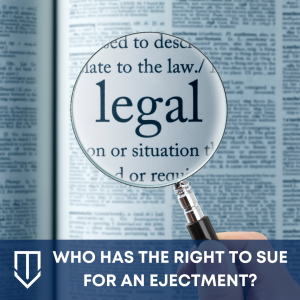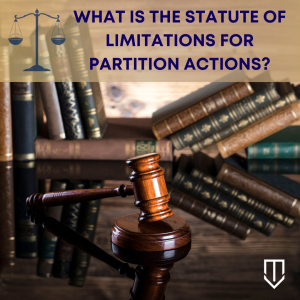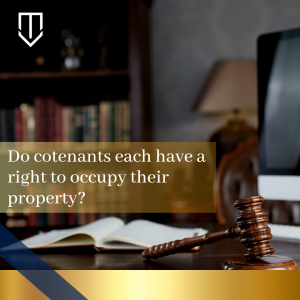 Ejectment is an action brought by a party seeking to recover a possessory interest or claim of title in a piece of real property. Typically, an ejectment action arises when a titleholder to a piece of property has been wrongfully excluded or withheld from the property. Therefore, ejectment applies only to those cases where an individual actually has possessory title to the subject property.
Ejectment is an action brought by a party seeking to recover a possessory interest or claim of title in a piece of real property. Typically, an ejectment action arises when a titleholder to a piece of property has been wrongfully excluded or withheld from the property. Therefore, ejectment applies only to those cases where an individual actually has possessory title to the subject property.
Ejectment is a possessory action used to recover possession of land or a piece of real property to a plaintiff in possession who has been wrongfully ousted from the property by the defendant. (Fuller v. Fuller (1917) 176 Cal. 637, 638, 169 P. 369].) In simpler terms, ejectment allows a party to retake possession of real property that the party was wrongfully removed from.
A claim of ejectment is a common issue in disputes over the real property where the parties are seeking to establish who holds title to or an interest in the subject property. Specifically, under Code of Civil Procedure section 3375, an individual who is entitled to specific real property may recover by a judgment for its possession or an order requiring a defendant to deliver possession of the property. (CCP § 3375.) At Underwood Law Firm, our attorneys are more than familiar with ejectment actions and the requirements needed to prevail on an ejectment claim.
 What is an Ouster (Civ. Code § 843)?
What is an Ouster (Civ. Code § 843)? California Partition Law Blog
California Partition Law Blog


 In most cases, no. Instead, the statute of limitations most frequently bars a partition action when a party’s rights to the property have lapsed due to an ouster.
In most cases, no. Instead, the statute of limitations most frequently bars a partition action when a party’s rights to the property have lapsed due to an ouster.  Ejectment is an action brought by a party seeking to recover a possessory interest or claim of title in a piece of real property. Typically, an ejectment action arises when a titleholder to a piece of property has been wrongfully excluded or withheld from the property. Therefore, ejectment applies only to those cases where an individual actually has possessory title to the subject property.
Ejectment is an action brought by a party seeking to recover a possessory interest or claim of title in a piece of real property. Typically, an ejectment action arises when a titleholder to a piece of property has been wrongfully excluded or withheld from the property. Therefore, ejectment applies only to those cases where an individual actually has possessory title to the subject property. Yes. Co-owners of property are entitled to certain rights, namely, the right to possess and use the property as they see fit. But sometimes, things do not work out with the other owners.
Yes. Co-owners of property are entitled to certain rights, namely, the right to possess and use the property as they see fit. But sometimes, things do not work out with the other owners.  If you co-own or are a co-tenant of a shared piece of real estate property, possession is not enough for the court to determine that the other party will lose their rights or their interest in your shared real estate property.
If you co-own or are a co-tenant of a shared piece of real estate property, possession is not enough for the court to determine that the other party will lose their rights or their interest in your shared real estate property.